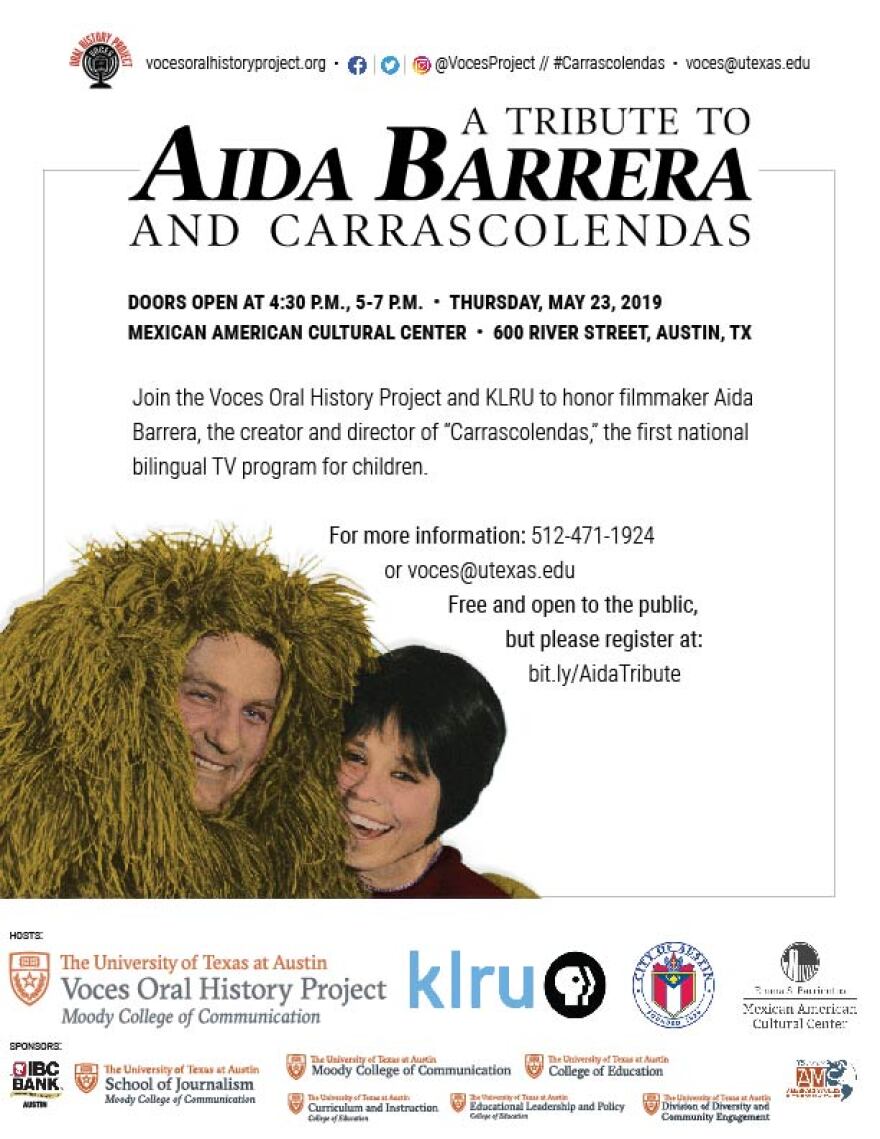“I had done some productions for KLRN prior to [Carrascolendas]… without budgets, you know,” says Aida Barrera. “But then I decided that maybe the time had come to go out and look for some funding and do a series that would have a different kind of goal. That turned out to be Carrascolendas.”
Barrera’s idea for the show that became Carrascolenda was to create an entertaining and educational program that would appeal to both Spanish and English speaking children. It was an ambitious undertaking that really couldn't be produced on the sort of shoestring budgets she’d been working with, so Barrera went looking for (and found) some grants to make the show possible.
“Our target audience was going to be the Mexican-American child, because it started locally within Texas,” Barrera says. “What we wanted to do was go out into mixed classrooms… and then to talk about the culture, the language, and then to do an elementary education curriculum. And then we came up with script ideas and characters and the whole thing.
“And I called it Carrascolendas because I was born in Carrascolendas and so was my entire family, and I thought it sounded fanciful. So it was a fanciful kind of mythical village in which these fanciful characters like Agapito the lion and all these others – you know, there were dolls that came to life and that kind of thing – where they interacted with children who were child actors.”
“We wanted to reflect the true multicultural view of what it meant to be an American,” Barrera says. “We didn’t want to say to this child that was Spanish-speaking, ‘this is only for you because you have a problem.’ So we had [a] diversity of people who participated, to reflect really what is the diversity in the country, the diversity that those children had in the classrooms.”
Carrascolendas debuted on KLRN (now KLRU) nearly 50 years ago, in 1970 and started airing nationally in 1974. Barrera says the show reached more parts of the world than she expected. “I still meet people who tell that they used to watch it,” she says. “Because I travelled throughout Latin America, and they would say they had watched it. Now we never sold it into those countries, right? But they watched it. Or I’m in Vancouver one day in a hotel, I turn on the television set, and there’s Carrascolendas. How it got there, I do not know. But it was there.”
This Thursday, Aida Barrera and Carrascolendas will be the subjects of a tribute that will take place at the Emma S. Barrientos Mexican American Cultural Center, sponsored by UT’s Voces Oral History Project and KLRU.
“I didn’t know Aida, but two years ago I picked up her book Looking For Carrascolendas,” says Maggie Rivas-Rodriguez, the founder and director of Voces. “And I read this book and I was really blown away. It was amazing – the accomplishments of this woman were amazing.” Rivas-Rodriguez eventually met Barrera while working on a Voces project, and “it started a friendship. And I knew that there would be a lot of people that had followed her over the years and really had a lot of affection for the show. So then I met with Bill Stotesbury over at KLRU and that’s where we are now.”
Stotesbury, the CEO and general manager of KLRU, wasn’t around when Carrascolendas went off the air in 1977, but had become very familiar with the show since joining the station. “We still get comments from people wanting to know about it, remembering that they watched it,” he says. “I think it’s important what a pioneering program it was that Aida created. And there really hasn’t been another program like it in kids’ television in the years since it went off the air. And I think creating that kind of a program that celebrates language and cross-cultural experience and imagination is a critical thing.”





